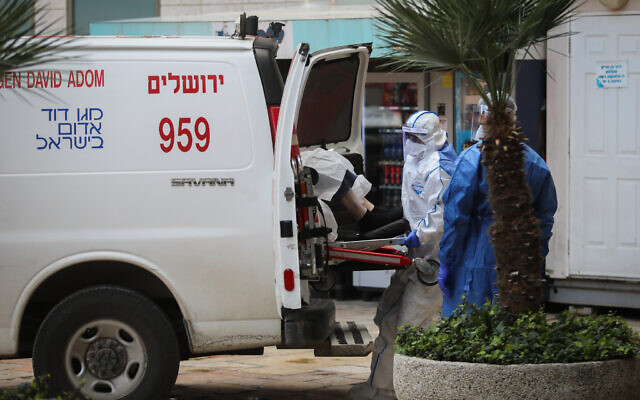Elderly patient was also suffering from diabetes and dementia, hospital says; he is second victim of virus from Nofim Tower sheltered living center

Jerusalem’s Hadassah Ein Kerem Medical Center announced Tuesday evening the death of an 87-year-old man from the coronavirus, Israel’s third fatality in the pandemic.
The man was brought to the hospital earlier this week from the sheltered living center where he lived, after testing positive for the virus, the hospital said. He had a series of underlying medical problems, including diabetes and dementia, it added in the statement.
The man was not immediately named.

He was the second resident of the Nofim Tower assisted living facility in Jerusalem to succumb to the illness. The first was Aryeh Even, 88, who passed away on Friday.
Earlier Tuesday, a 67-year-old woman, named as Malka Keva from the coastal city of Bat Yam, died of the coronavirus in Holon’s Wolfson Medical Center, the hospital said.
Keva suffered from “a serious preexisting medical condition,” according to the hospital. Several years ago, she fell ill with cancer and had been in a weakened state when she contracted the virus.
On Tuesday morning, the Health Ministry reported that the number of diagnosed cases of coronavirus in the country had risen to 1,656, an increase of 214 from the previous night.
So far, 49 people have recovered from COVID-19, the disease caused by the virus, the ministry said in its morning update.
Of those being treated, 30 are in serious condition.
Over 71,000 Israelis are in quarantine, down from nearly 75,000 reported on Monday morning. In total, over 135,000 have spent time in self-isolation, almost 6,000 more than the number reported on Monday morning.
The rise in cases came alongside a boost in the number of tests for the virus, with 3,743 people tested in the previous 24 hours. On Monday morning the ministry said it had tested 3,230 in the previous 24-hour period.
Tuesday’s increase followed what appeared to be the biggest single-day jump on Monday, when the ministry reported 371 new cases for a total of 1,442. The ministry generally sends out two updates a day, in the morning and at night, and Tuesday’s 12-hour surge of 214 since the previous report could indicate the record will again go up by the end of the day.

Israel is in 21st place on a list of cases by countries hit by the virus, according to data from the Johns Hopkins University virus website, which collates information on the global outbreak. China remains at the top, followed by Italy, the US, and Spain.
Israel is reportedly set to announce drastic new restrictions on public movement it hopes will help stanch the spread of the virus, though policy experts expect any effect to only be seen in 10 days or more.
On Monday, Prime Minister Benjamin Netanyahu held a meeting with officials from the Health and Finance ministries as well as other government departments to review implementation of further isolation orders that Hebrew media reported would include a complete shutdown of the public transportation system and limiting citizens to straying no further than a couple of hundred meters from their homes, unless they are traveling to or from work or buying essential items. All stores will be shut, aside from groceries and pharmacies, according to reports, and police powers to enforce the measures will be ratcheted up.
The Health Ministry has already ordered the public to stay indoors unless necessary and banned gatherings of more than 10 people. Universities, schools, kindergartens, and leisure sites have all been closed.
As reported by The Times of Israel
